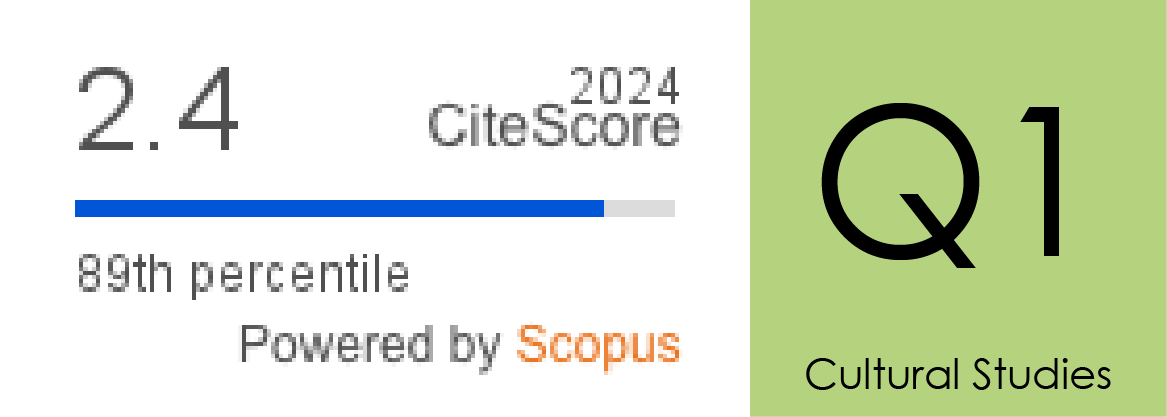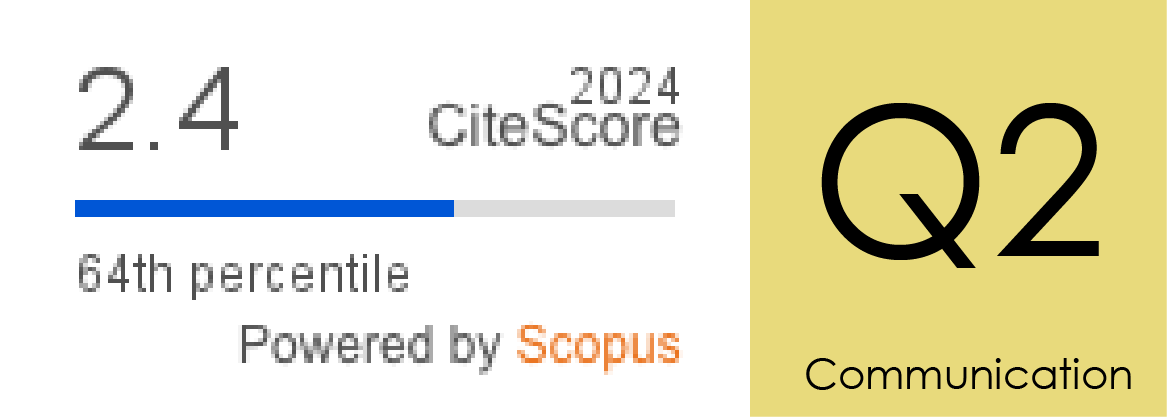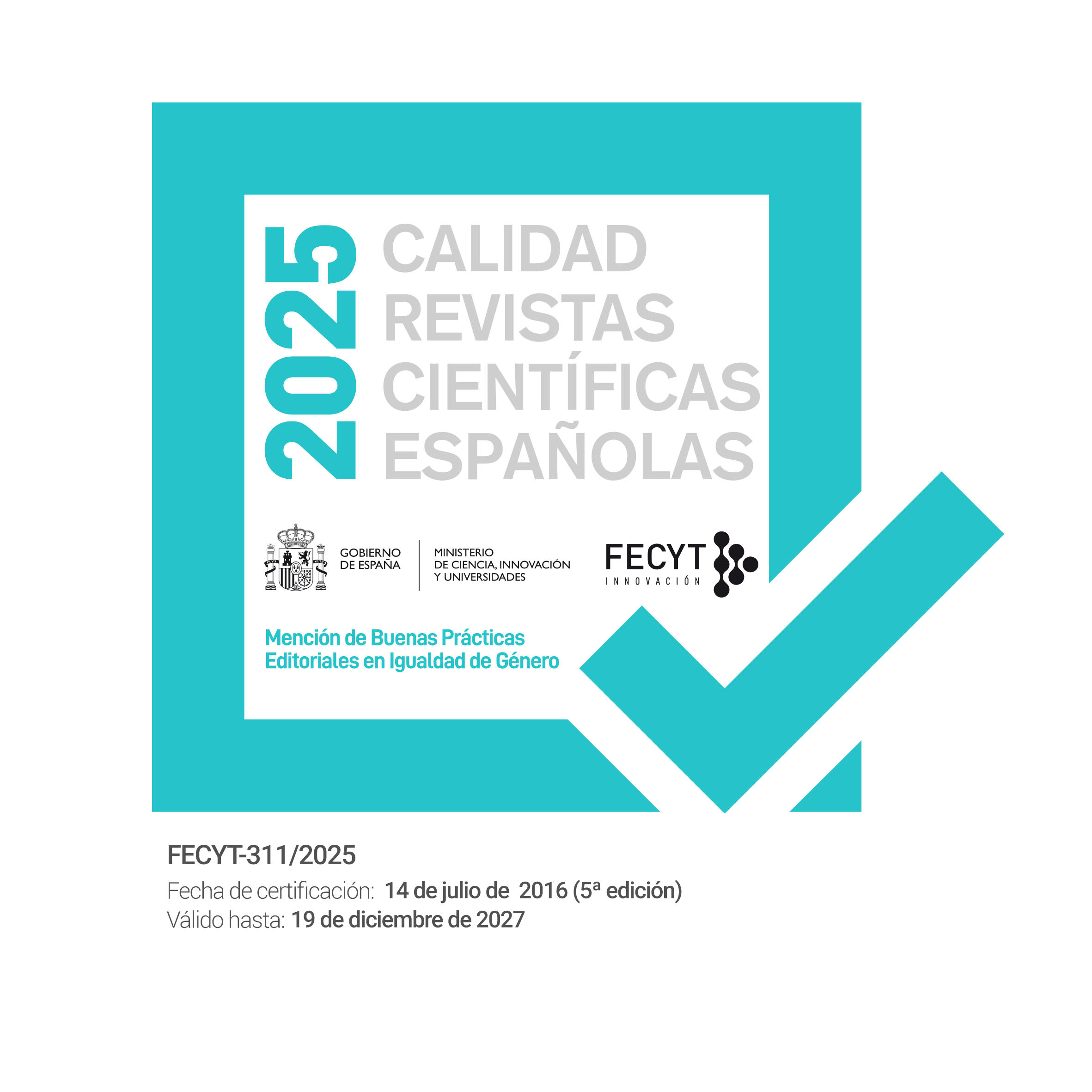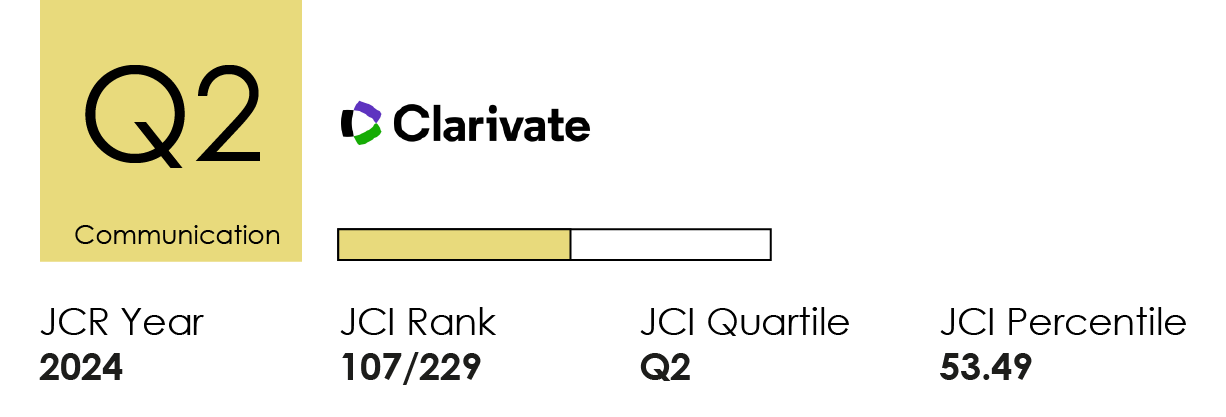El estado de “Europeanización”: Entre conflicto y convergencia. Una comparación de cobertura de las Elecciones Europeas 2019 en siete países
DOI:
https://doi.org/10.14198/MEDCOM000021Palabras clave:
Europeanización, Esfera pública europea, Elecciones UE, LDA, Modelado de temas, Investigación comparativaResumen
La “europeización” de las esferas públicas nacionales es una cuestión de crear un espacio mediático discursivo dentro de la UE. Hay fuerzas de convergencia, como redes en el espacio digital. Al mismo tiempo, hay fuerzas contrarias, un creciente nacionalismo y populistas que critican las élites a “Bruselas”. Aparentemente, la visión de una esfera pública europea comparte su suerte con el proyecto europeo: después de años de crisis, el optimismo se convirtió en desilusión. Utilizando la cobertura mediática de las elecciones de la UE de 2019 en siete países europeos (57.943 artículos de Alemania, Hungría, Italia, Polonia, Portugal, la República Checa y el Reino Unido), dibujamos cuadro de un público heterogéneo de la UE. Resulta claramente que la europeización horizontal y vertical requieren interpretaciones diferenciadas. Un alto grado de europeización horizontal indica una cobertura mediática convergente y pro-europea (como Alemania o Portugal), un alto grado vertical puede indicar un público polarizado o un panorama mediático poco libre (como el Reino Unido o Hungría). En cuanto a metodología, el estudio muestra que una combinación de análisis de contenido computacional y cooperación internacional puede adelantar la investigación en el público europeo.
Citas
Benert, V. & Pfetsch, B. (2021). Europäische Öffentlichkeit unter dem Einfluss von Digitalisierung und Politisierung. In I. Borucki, K. Kleinen-von Königslöw, S. Marschall, & T. Zerback (Eds.), Handbuch Politische Kommunikation. Wiesbaden, Germany: Springer VS.
Blei, D. M.; Ng, A. Y. & Jordan, M. I. (2003). Latent Dirichlet Allocation. Journal of Machine Learning Research, 3, 993–1022. https://bit.ly/3nxgrmz
Bobba, G. & Seddone, A. (2018). How do Eurosceptic parties and economic crisis affect news coverage of the European Union? Evidence from the 2014 European elections in Italy. European Politics and Society, 19(2), 147–165. https://doi.org/fh9w
Boomgaarden, H. G.; De Vreese, C. H.; Schuck, A. R. T.; Azrout, R.; Elenbaas, M.; Van Spanje, J. H. P. & Vliegenthart, R. (2013). Across time and space: Explaining variation in news coverage of the European Union: Across time and space. European Journal of Political Research, 52(5), 608–629. https://doi.org/f427h6
Boomgaarden, H. G.; Vliegenthart, R.; de Vreese, C. H. & Schuck, A. R. T. (2010). News on the move: Exogenous events and news coverage of the European Union. Journal of European Public Policy, 17(4), 506–526. https://doi.org/b6dh6w
Boomgarden, H. G. & de Vreese, C. H. (2016). Effects of News Media Coverage on Public Support for European Integration. In W. van der Brug & C. H. de Vreese (Eds.), (Un)intended Consequences of EU Parliamentary Elections (pp. 237–254). Oxford, UK: Oxford University Press. https://doi.org/fh9x
Borchardt, A.; Simon, F. M. & Bironzo, D. (2018). Interested but not Engaged: How Europe’s Media Cover Brexit. Reuters Institute for the Study of Journalism. https://bit.ly/32CPh55
Bouchet-Valat, M.; Ljubownikow, G.; Krueger, J. & Nicholls, T. (2019). tm.plugin.factiva: Import Articles from “Factiva” Using the “tm” Text Mining Framework (1.8). https://bit.ly/3jwb1X9
Brüggemann, M.; Engesser, S.; Büchel, F.; Humprecht, E. & Castro, L. (2014). Hallin and Mancini Revisited: Four Empirical Types of Western Media Systems: Hallin and Mancini Revisited. Journal of Communication, 64(6), 1037–1065. https://doi.org/f6sfnv
Brüggemann, M. & Kleinen-von Königslöw, K. (2009). `Let’s Talk about Europe’: Why Europeanization Shows a Different Face in Different Newspapers. European Journal of Communication, 24(1), 27–48. https://doi.org/bwvfk7
Chan, J. M. & Lee, F. L. F. (Eds.). (2017). Advancing comparative media and communication research. London, UK: Routledge. https://doi.org/fh9z
Curtice, J. (2019). Polarised Politics—The European Elections in the UK. Political Insight, 10(3), 8–11. https://doi.org/fh92
de Vreese, C. H. (2014). Mediatization of News: The Role of Journalistic Framing. In F. Esser & J. Strömbäck (Eds.), Mediatization of Politics (pp. 137–155). Basingstoke, UK: Palgrave Macmillan. https://doi.org/d8g2
Demeter, M. & Goyanes, M. (2020). Antecedents of leaving the European Union: The role of nostalgia and attitudes towards diversity in Spain, Italy, and Greece. Mediterranean Politics. https://doi.org/fh93
Díez Medrano, J. & Gray, E. (2010). Framing the European Union in National Public Spheres. In R. Koopmans & P. Statham (Eds.), The Making of a European Public Sphere (pp. 195–220). Cambridge University Press. https://doi.org/fh94
Dobek-Ostrowska, B. (2011). Italianization (or Mediterraneanization) of the Polish Media System? Reality and Perspective. In D. C. Hallin & P. Mancini (Eds.), Comparing Media Systems Beyond the Western World (pp. 69–108). Cambridge, UK: Cambridge University Press. https://doi.org/ggk8kg
Dobek-Ostrowska, B. (2015). 25 years after communism: Four models of media and politics in Central and Eastern Europe. In B. Dobek-Ostrowska & M. Głowacki (Eds.), Democracy and Media in Central and Eastern Europe 25 Years On (pp. 11–46). Bern, Switzerland: Peter Lang. https://doi.org/fh95
Dobek-Ostrowska, B. & Głowacki, M. (2008). Introduction: Central European Media between Politicization and Commercialization. In B. Dobek-Ostrowska & M. Głowacki (Eds.), Comparing media systems in Central Europe: Between commercialization and politicization (pp. 9–26). Wroclaw, Poland: Wydawn. Uniwersytetu Wrocławskiego.
Dutceac Segesten, A. & Bossetta, M. (2019). Can Euroscepticism Contribute to a European Public Sphere? The Europeanization of Media Discourses on Euroscepticism across Six Countries. JCMS: Journal of Common Market Studies, 57(5), 1051–1070. https://doi.org/ggdwbw
Esser, F. (2000). Journalismus vergleichen. Komparative Forschung und Theoriebildung. In M. Löffelholz (Ed.), Theorien des Journalismus: Ein diskursives Handbuch (pp. 151–180). Opladen, Germany: Westdt. Verl. https://doi.org/fh96
Esser, F., & Umbricht, A. (2013). Competing models of journalism? Political affairs coverage in US, British, German, Swiss, French and Italian newspapers. Journalism: Theory, Practice & Criticism, 14(8), 989–1007. https://doi.org/gdqc5s
Felbermayr, G.; von Ondarza, N.; Gros, D.; Watt, A. & Pianta, M. (2019). Nach der Wahl zum Europäischen Parlament—Mehr Europa oder weniger? Wirtschaftsdienst, 99(6), 379–399. https://doi.org/fh97
Fengler, S. & Kreutler, M. (2020). Stumme Migranten, laute Politik, gespaltene Medien. Die Berichterstattung über Flucht und Migration in 17 Ländern (OBS-Arbeitspapier 39). Otto Brenner Stiftung. https://bit.ly/3jr3msR
Fengler, S.; Kreutler, M.; Alku, M.; Barlovac, B.; Bastian, M.; Bodrunova, S. S.; Brinkmann, J.; Dingerkus, F.; Hájek, R.; Knopper, S.; Kus, M.; Láb, F.; Lees, C.; Litvinenko, A.; Medeiros, D.; Orlova, D.; Ozolina, L.; Paluch, A.; Nicoleta Radu, R., … Zguri, R. (2020). The Ukraine conflict and the European media: A comparative study of newspapers in 13 European countries. Journalism, 21(3), 399–422. https://doi.org/fh98
Gerhards, J. (1993). Westeuropäische Integration und die Schwierigkeiten der Entstehung einer europäischen Öffentlichkeit. Zeitschrift Für Soziologie, 22(2), 96–110. https://doi.org/fh99
Gerhards, J. (2000). Europäisierung von Ökonomie und Politik und die Trägheit der Entstehung einer europäischen Öffentlichkeit. In M. Bach (Ed.), Die Europäisierung nationaler Gesellschaften (pp. 277–305). Opladen, Germany: Westdt. Verl. https://doi.org/fjfp62
Gruber, J. (2020). LexisNexisTools: Working with Files from “LexisNexis” (0.3.1). https://bit.ly/3bhtjsg
Hallin, D. C. & Mancini, P. (2004). Comparing Media Systems: Three Models of Media and Politics. Cambridge, UK: Cambridge University Press. https://doi.org/drqwt4
Hallin, D.C. & Mancini, P. (2010). Comparing media systems: a response to critics. Media & Jornalismo, 9(2), 53–67.
Hallin, D. C. & Mancini, P. (Eds.). (2011). Comparing Media Systems Beyond the Western World. Cambridge, UK: Cambridge University Press. https://doi.org/ggk8kg
Hanitzsch, T. & Esser, F. (2012). Challenges and perspectives of comparative communication inquiry. https://doi.org/fjbb
Hobolt, S. (2019). European Elections 2019: A More Fragmented Parliament. Political Insight, 10(3), 16–19. https://doi.org/fjbc
Jacobi, C.; van Atteveldt, W. & Welbers, K. (2016). Quantitative analysis of large amounts of journalistic texts using topic modelling. Digital Journalism, 4(1), 89–106. https://doi.org/f3s2sg
Jakubowicz, K. (2008). Riviera on the Baltic? Public Service Broadcasting in Post-Communist Countries. In B. Dobek-Ostrowska & M. Głowacki (Eds.), Comparing media systems in Central Europe: Between commercialization and politicization (pp. 41–54). Wroclaw, Poland: Wydawn. Uniwersytetu Wrocławskiego.
Jakubowicz, K. & Sükösd, M. (2008). Twelve Concepts Regarding Media System Evolution and Democratization in Post-Communist Societies. In K. Jakubowicz & M. Sükösd (Eds.), Finding the right place on the map: Central and Eastern European media change in a global perspective (pp. 9–40). Bristol, UK: Intellect Books.
Kaiser, J. & Kleinen-von Königslöw, K. (2017). The Framing of the Euro Crisis in German and Spanish Online News Media between 2010 and 2014: Does a Common European Public Discourse Emerge? The Framing of the Euro Crisis. JCMS: Journal of Common Market Studies, 55(4), 798–814. https://doi.org/fjbd
Kantner, C. (2003). Öffentliche politische Kommunikation in der EU Eine hermeneutisch-pragmatistische Perspektive. In A. Klein; R. Koopmanns; H.-J. Trenz; L. Klein; C. Lahusen & D. Rucht (Eds.), Bürgerschaft, Öffentlichkeit und Demokratie in Europa (pp. 213–229). Wiesbaden, Germany: VS Verlag für Sozialwissenschaften. https://doi.org/fjbf
Kennedy, P. (2019). The relentless march of the Hungarian government’s propaganda machine. European Journalism Observatory. https://bit.ly/38D0s2m
Königslöw, K. K. (2012). Europe in crisis? Testing the stability and explanatory factors of the Europeanization of national public spheres. International Communication Gazette, 74(5), 443–463. https://doi.org/dtbz
Koopmans, R. & Erbe, J. (2004). Towards a European public sphere?: Vertical and horizontal dimensions of Europeanized political communication. Innovation: The European Journal of Social Science Research, 17(2), 97–118. https://doi.org/dz2gvz
Koppers, L.; Rieger, J.; Boczek, K. & von Nordheim, G. (2020). tosca: Tools for Statistical Content Analysis (0.2-0. https://bit.ly/32CX5nf
Kuś, M. (2019). Public service broadcasting and media polarization in Poland. Jahrbuch für Christliche Sozialwissenschaften, Bd. 60 (2019): Öffentlichrechtliche Medien. https://doi.org/fjbg
Livingstone, S. (2003). On the Challenges of Cross-National Comparative Media Research. European Journal of Communication, 18(4), 477–500. https://doi.org/fm42sr
Mellado, C. (2020). Beyond Journalistic Norms. Role Performance and News in Comparative Perspective. London, UK: Taylor & Francis. https://doi.org/fjbh
Mihelj, S. & Huxtable, S. (2018). From Media Systems to Media Cultures. Cambridge University Press. https://doi.org/fjbj
Müller, H.; Porcaro, G. & von Nordheim, G. (2018). Tales from a crisis: Diverging narratives of the euro area (Bruegel Policy Contribution). https://bit.ly/3hHd89P
Picard, R. G. (Ed.). (2015). The Euro crisis in the media: Journalistic coverage of economic crisis and european institutions. London, UK: I.B. Tauris. https://doi.org/fjbk
Polyák, G. (2016). A Major Step Towards An Authoritarian Media Regime In Hungary. European Journalism Observatory. https://bit.ly/32AT7fE
Polyák, G. (2020). The decline and fall of Hungary’s leading news brand. European Journalism Observatory. https://bit.ly/38I2xK5
Reif, K. & Schmitt, H. (1980). Nine second-order National Elections—A conceptual framework for the analysis of European Election results. European Journal of Political Research, 8(1), 3–44. https://doi.org/c67mvw
Reporters without borders (2015). 2015 World Press Freedom Index. https://bit.ly/2K5riFT
Reporters without borders (2020a). 2020 World Press Freedom Index. https://bit.ly/38KxiOO
Reporters without borders (2020b). Czech Republic: Increasing media concentration. https://bit.ly/2UphRTG
Reporters without borders (2020c). Hungary: Things do not improve. https://bit.ly/3npAeV8
Risse, T. (2014). No Demos? Identities and Public Spheres in the Euro Crisis. JCMS: Journal of Common Market Studies, 52(6), 1207–1215. https://doi.org/fjbn
Santana-Pereira, J. (2016). The Portuguese media system and the normative roles of the media: a comparative view. Análise Social, 221(4), 780–801. https://bit.ly/2ILFUd9
Schmitt, H. (2005). The European Parliament Elections of June 2004: Still Second-Order? West European Politics, 28(3), 650–679. https://doi.org/cwtrrm
Schuck, A. R. T. & de Vreese, C. H. (2011). Finding Europe: Mapping and explaining antecedents of ‘Europeanness’ in news about the 2009 European Parliamentary Elections. Studies in Communication | Media, 0(2), 265–294. https://doi.org/fjbq
Schulmeister, P.; Büttner, Chiesa, A.; Defourny, E.; Hallaouy, S.; Maggio, L.; Tsoulou-Malakoudi, D.; Friedli, M. E. & Van Gasse, B. (2019). CLOSER TO THE CITIZENS, CLOSER TO THE BALLOT. (A Public Opinion Monitoring Study 91.1; Eurobarometer Survey). https://bit.ly/3b952o5
Szynol, A. (2020). “Re-Polonisation” back on the agenda for Poland’s private media. European Journalism Observatory. https://bit.ly/3lvQZOe
Wessler, H.; Peters, B.; Brüggemann, M.; Kleinen-von Königslöw, K. & Sifft, S. (2008). Transnationalization of public spheres. Basingstoke, UK: Palgrave Macmillan. https://doi.org/fkk9kh
Descargas
Estadísticas
Publicado
Cómo citar
Número
Sección
Licencia
Derechos de autor 2021 Gerret von-Nordheim, Tina Bettels-Schwabbauer, Philip Di-Salvo, Paula Kennedy, Kornélia-R. Kiss, Michal Kuś, Ana Pinto-Martinho, Sandra Stefanikova, Décio Telo

Esta obra está bajo una licencia internacional Creative Commons Atribución-CompartirIgual 4.0.
Los autores y autoras que publican en esta revista están de acuerdo con los siguientes términos:
1 Derechos de autor. Los autores y autoras conservan sus derechos de autor, aunque ceden a la revista de forma no exclusiva los derechos de explotación (reproducción, distribución, comunicación pública y transformación) y garantizan a esta el derecho de primera publicación de su trabajo, el cual estará simultáneamente sujeto a la licencia indicada en punto 2. Los autores pueden establecer otros acuerdos adicionales para la distribución no exclusiva de la versión de la obra publicada en la revista, siempre que exista un reconocimiento de su publicación inicial en esta revista.
© Los autores.
2 Licencia. Los trabajos se publican en la revista sujetos a la licencia de Reconocimiento 4.0 Internacional de Creative Commons (CC BY 4.0); los términos se pueden consultar en https://creativecommons.org/licenses/by/4.0/
Esta licencia permite a terceros compartir (copiar y redistribuir el material en cualquier medio o formato) y adaptar (remezclar, transformar y crear a partir del material para cualquier finalidad, incluso comercial), siempre que se reconozca la autoría y la primera publicación en esta revista (Revista Mediterránea de Comunicación (RMC) / Mediterranean Journal of Communication (MJC), Universidad de Alicante, DOI de la obra), se proporcione un enlace a la licencia y se indique si se han realizado cambios en la obra.
3 Política de autoarchivo. Se recomienda a los autores que difundan sus trabajos a través de Internet para favorecer una circulación y difusión más rápidas y, con ello, un posible aumento en la citación y alcance entre la comunidad científica y académica, en las siguientes condiciones:
No se permite a los autores depositar en un repositorio institucional o temático, página web propia, etc., las versiones preprint (versión antes de ser evaluada) o postprint (versión evaluada y aceptada para su publicación) de sus trabajos antes de su publicación, pero sí el artículo final publicado (versión del editor).














